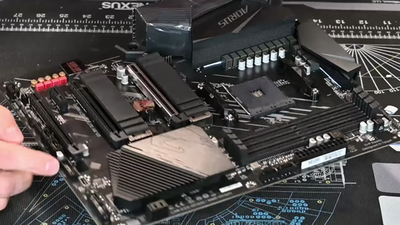
My use of the Gigabyte B550 AORUS ELITE V2 ATX Motherboard WiFi 6 (2024)
My thoughts on the Gigabyte B550 Aorus Elite V2: performance, design, use cases, and BIOS updates.
Introduction
I recently upgraded my motherboard to the Gigabyte B550 Aorus Elite V2. I experienced a noticeable improvement in performance and features compared to my older systems. It offers various advantages such as compatibility with latest AMD Ryzen processors, enhanced thermal design, and faster connectivity options. My gaming and work tasks have significantly benefited. However, I encountered some challenges during WiFi setup and found that there are limited SATA ports. Despite these issues, the overall quality and functionality have been quite impressive.
Some photos (click to enlarge)
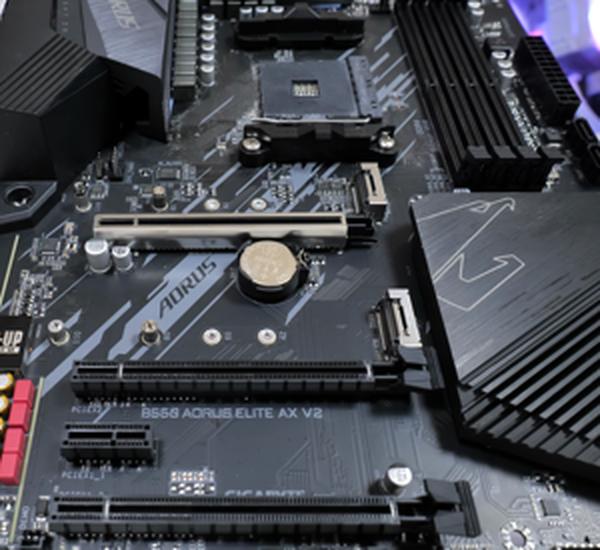
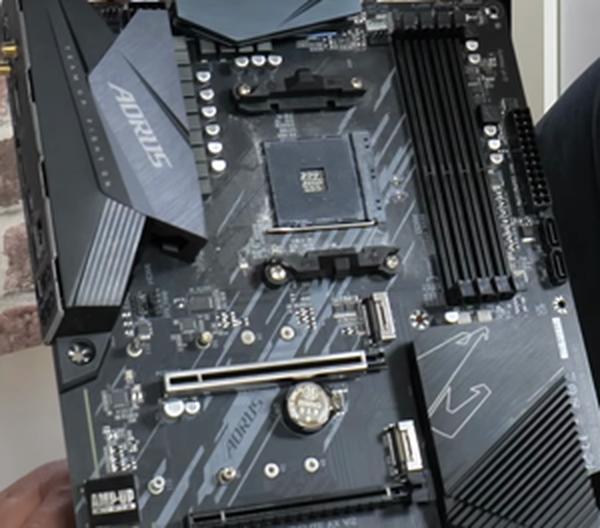
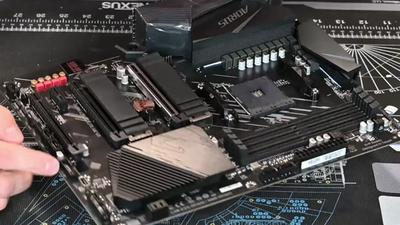
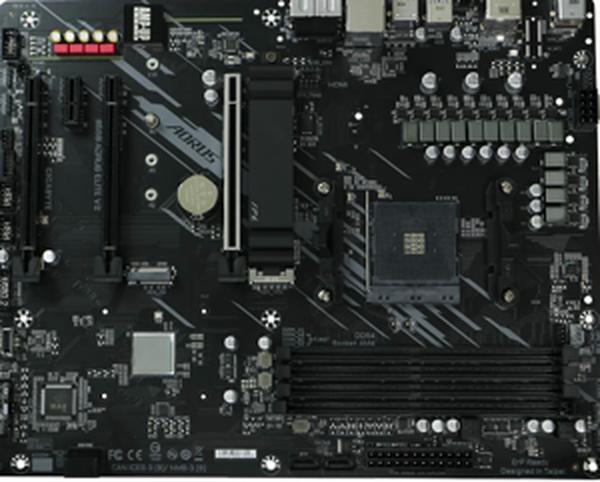
Specs of the Gigabyte B550 AORUS ELITE V2 Motherboard
- Release Year
- Brand
- Chipset Type
- Compatible Devices
- Compatible Processors
- Cpu Socket
- Memory Clock Speed
- Memory Storage Capacity
- Model Name
- Platform
- Ram Memory Technology
Prices
Initial Impressions and Performance
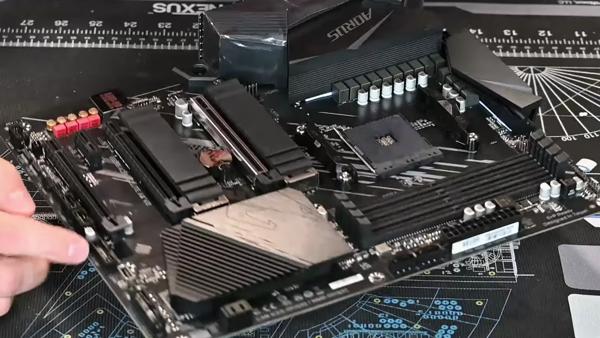
Upgrading from a system I've used since 2010, the Gigabyte B550 Aorus Elite V2 has been a remarkable leap forward in performance and features. My previous builds, including an ASRock and Gigabyte B450m, served me well, but were starting to lag behind in the latest technology advancements. Here are the key things that stood out for me with this motherboard:
Support for 3rd Gen AMD Ryzen processors: This compatibility ensures that I can use powerful CPUs for demanding tasks.
Dual Channel ECC/ Non-ECC Unbuffered DDR4, 4 DIMMs: The flexibility in RAM options is great for stability and performance.
Advanced thermal design: The enlarged heatsinks give me peace of mind concerning thermal management.
PCIe 4.0 support: Future-proofing with the latest PCIe standard was a big win for my GPU and storage devices.
However, I did note a couple of drawbacks. While the board includes two M.2 slots, I would've preferred an additional two SATA ports for more storage, given there are only four. And while the built-in WiFi is a plus, the chip initially gave me some trouble, requiring driver reinstalls.
The board's aesthetic is quite pleasing, and although the RGB is subtle and may not appeal to those looking for a more flashy setup, it suits my taste just fine. Out of the box, the B550 Aorus Elite V2 offered impressive boot times and a hassle-free BIOS flash, reaffirming the quality and user-friendliness I've come to expect from Gigabyte. My Ryzen 7 3700X and RX 5700XT are performing without hitches, delivering a gaming experience that's nothing short of unreal.
Initial challenges with the board included a start-pause-restart sequence that was momentarily disconcerting, but it quickly resolved itself into a stable operating state. Throughout my use, I appreciated the extensive feature set that rivals more expensive motherboards, especially the AMP-UP audio, Dual Thermal Guards, and a plethora of headers for connectivity and customization.
In terms of future-proofing, this motherboard has been a safe bet. The inclusion of cutting-edge technology like USB-C, Digital VRM, PCIe 4.0, USB3.2, Realtek ALC1200, Intel WiFi 6, and Bluetooth ensures that this board can handle upcoming hardware and software advancements with ease. Admittedly, should eventual upgrades be necessary, I may look into other brands to compare, but the B550 Aorus Elite V2 has, for now, cemented its place in my workstation with its reliable and feature-rich design.
Design and Connectivity

Design and Connectivity are two critical aspects of any modern motherboard, and the Gigabyte B550 Aorus Elite V2 doesn't disappoint in these domains. Here are some of the key features and a few drawbacks I've noted:
Support for 3rd Gen AMD Ryzen Processors: This ensures compatibility with some of the latest CPUs on the market, which is a big plus for future-proofing builds.
Dual Channel ECC/ Non-ECC Unbuffered DDR4, 4 DIMMs: The flexibility to use either ECC or non-ECC memory is great for both stability and performance adjustments.
Advanced Thermal Design: The enlarged surface heatsinks are crucial for keeping temperatures in check during heavy usage.
PCIe 4.0 x16 Slot: Offers high-speed connectivity for the latest GPUs, a boon for gamers and creators alike.
Dual Ultra-Fast NVMe PCIe 4.0/3.0 x4 M.2 with Dual Thermal Guards: This is vital for high-speed storage, which is essential for reducing load times and improving overall system responsiveness.
However, there are a couple of aspects where the board could improve:
Only four SATA ports are offered, which might limit storage expansion for users who need more.
The board could benefit from more USB ports for users with multiple peripherals.
The inclusion of both WiFi 6 and Bluetooth 5 with the AORUS Antenna garners appreciation, especially considering the need for wireless connectivity in modern setups. The convenience of the antenna's magnetic design is a subtle but appreciated touch.
Moreover, the board's audio capabilities are decent, leveraging the ALC1200 and WIMA Capacitors for a superior sound experience, which doesn't always get noticed in motherboard reviews. This added detail is a testament to the board's design catering to an immersive experience, whether for gaming or media consumption.
On the downside, while the board boasts a dual band 2.5GbE LAN, the actual internet and download speeds can vary, and a few users have reported issues with the WiFi chip and the need for multiple driver installations to achieve optimal performance. This is a point of frustration that shouldn't be overlooked when considering the B550 Aorus Elite V2.
My personal experience with the board's design and connectivity has largely been favorable. The Pre-installed IO Shield simplifies the installation process, which is a welcome feature for both first-time builders and veterans looking to expedite setup. The board also promotes a clean aesthetic for the build, with a Smart Fan 5 feature that capably controls noise levels, and RGB FUSION 2.0 which supports both addressable and RGB LED strips for those who value personalization.
In essence, the Gigabyte B550 Aorus Elite V2 offers an impressive array of features for gamers and creators aiming for a robust build with some future-proofing elements. Despite a few connectivity limitations and potential WiFi inconsistencies, its strong performance, comprehensive connectivity options, and value for money make it a motherboard worth considering.
Gaming and Productivity Use

In the realm of gaming and productivity, the Gigabyte B550 Aorus Elite V2 offers a compelling combination of features that cater to both arenas. As a user who demands reliability and performance, I appreciate the well-rounded nature of this motherboard, especially considering its price point in comparison to other high-end options.
Support for 3rd Gen AMD Ryzen Processors: No need to worry about CPU compatibility, as this board is ready for some of the best CPUs on the market.
Dual Channel ECC/ Non-ECC Unbuffered DDR4, 4 DIMMs: Ample RAM capacity for multitasking and memory-intensive applications.
PCIe 4.0 Support: Essential for the latest GPUs and NVMe drives, drastically improving load times and game performance.
Onboard Intel WiFi 6 802.11ax 2T2R & BT5: Easy connectivity and the ability to game with a wireless controller without additional dongles.
For gaming, the ultra-durable PCIe 4.0 x16 slot keeps my graphics card securely connected, and there's noticeable improvement in load times with the NVMe PCIe 4.0 slots. The multiple display support through HDMI and DisplayPort, coupled with the motherboard's durable build, ensure that heavy gaming sessions go uninterrupted.
Simultaneously, the motherboard's advanced thermal design keeps temperatures in check during heavy workloads in productivity tasks. Both the heatsinks and the smart fan technology contribute to maintaining optimal performance. My application compilation tasks and video rendering seem smoother than ever, without the system breaking a sweat.
However, not all is perfect. For instance, while the WiFi and Bluetooth capabilities are solid, I've noted that some users have reported needing to reinstall drivers several times. In addition, with only 4 SATA ports, storage expansion is somewhat limited compared to other motherboards offering 6 or more.
While my experience with installation and BIOS updates has been hassle-free—a testament to the efficient Q-Flash Plus feature—I recognize that some may find the process daunting or run into compatibility issues necessitating a BIOS update.
In summary, for anyone not ready to leap to AM5, this motherboard is a value-packed gateway to enhance the gaming and productivity experience without breaking the bank. It strikes a balance between high-end features and cost-effectiveness, though with a few minor points that could be improved upon. As it stands, the Gigabyte B550 Aorus Elite V2 is a workhorse that should satisfy the needs of both gamers and power users alike.
BIOS Features and Updates

The BIOS Features and Updates on the Gigabyte B550 Aorus Elite V2 motherboard offer a user-friendly experience with a notable range of options for fine-tuning and upgrading. Personally, I appreciate the effort that Gigabyte has put into making the BIOS user interface intuitive and accessible, even for those who may not be the most tech-savvy.
Key Features:
The motherboard supports easy updates via Q-Flash Plus, which means you can update the BIOS without a CPU, memory, or graphics card installed. This is a big plus for users who want to upgrade their system in stages or troubleshoot without full hardware.
Q-Flash Plus also simplifies the installation process, providing a seamless and less intimidating experience for first-time builders or upgraders.
Now, diving a bit deeper into the BIOS, Gigabyte has incorporated a Digital Twin Power Design which, combined with its 12+2 phase VRM, ensures stable power delivery to the CPU — a benefit for both longevity and overclocking endeavors. I've found it provides a reassuring level of performance stability, particularly under heavy loads or while pushing system limits.
However, with the good comes slight drawbacks—the Wi-Fi chip initially posed some challenges. I had to reinstall drivers multiple times, which was frustrating, but once resolved, the connectivity has been consistent. Still, for those who prioritize wireless connections, setting this up might require a bit of patience.
Another hiccup I noticed is that certain BIOS versions can be tricky to locate on the Gigabyte website, an area where clarity could be improved. While a specific BIOS may be required for optimum performance, especially following hardware upgrades like a new CPU, it's a task that necessitates more straightforward navigation from the manufacturer's end.
Considering the above, here's a brief rundown:
Pros:
No CPU, memory, GPU needed for BIOS updates via Q-Flash Plus
Stable power design for reliable performance
Cons:
Initial Wi-Fi driver issues that require patience to resolve
Difficulty in locating specific BIOS versions online
To wrap up, the Gigabyte B550 Aorus Elite V2’s BIOS and update functionalities are robust and comprehensive, delivering a level of detail and user-friendliness that sets it apart from some competitors. Even with a few imperfections, the overall BIOS experience enhances the motherboard’s value. It's a cornerstone feature that bolsters confidence in the system’s capabilities, particularly when considering the balance between its usability and the advanced control it offers.
Comments (0)
Share